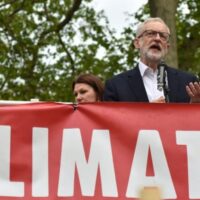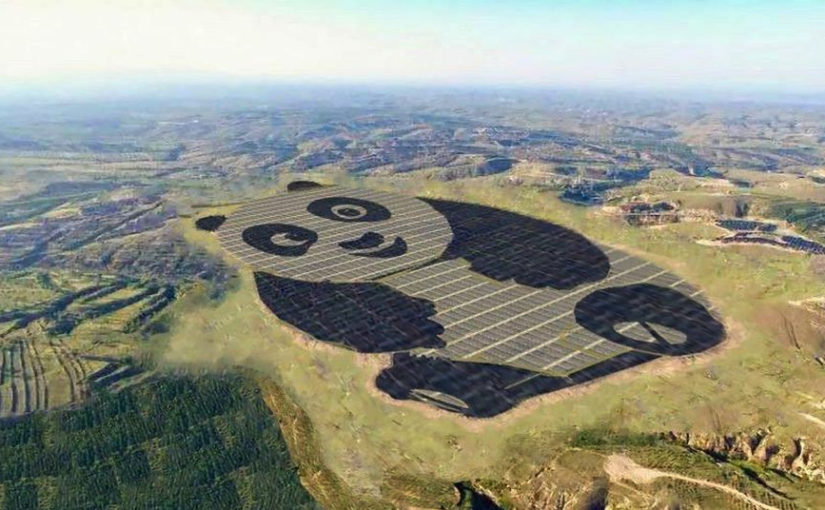This article was originally published by Morning Star on 02 December, 2019. It has also been posted on Socialist Economic Bulletin.
Climate change is the most important political issue of our generation. There’s 99 percent scientific consensus that humans are causing global warming and that, unless we stop putting greenhouse gases in the atmosphere, life on earth will become increasingly unviable. If we continue at the current trajectory in terms of greenhouse gas emissions, we’re facing over four degrees Celsius of warming by the year 2100. David Wallace-Wells writes in his book The Uninhabitable Earth: A Story of the Future that, “according to some estimates, that would mean that whole regions of Africa and Australia and the United States, parts of South America north of Patagonia, and Asia south of Siberia would be rendered uninhabitable by direct heat, desertification, and flooding.”
According to the UN’s Intergovernmental Panel on Climate Change (IPCC), humanity needs to halve its greenhouse gas emissions by 2030 and hit net zero by 2050. If we fail to hit those deadlines, hundreds of coastal cities (including New York, Shanghai, Hong Kong, Mumbai and Lagos) will likely be permanently submerged; the agricultural system faces collapse; wars will be fought over climate change-induced scarcity of resources; and there will be hundreds of millions of climate refugees. Floods, droughts, hurricanes, typhoons and wild fires will become so commonplace as to barely be newsworthy. The results of climate change are already all too visible: 18 of the 19 warmest years on record have all occurred since 2001, and we’re witnessing an unusually high rate of extreme weather events.
Most environmentalists agree that the safe upper limit for global warming before the planet reaches an irreversible tipping point is 1.5 degrees centigrade. Bearing in mind that the average global temperature today is already 0.9 degrees higher than it was in 1880, we’re only left with 0.6 degrees before we hit the point of no return.
What needs to happen?
There is one critical target to focus on for the next decade, as outlined in the IPCC Special Report on 1.5 degrees, which is to reduce global carbon emissions to 50 percent of current levels.
Labour’s manifesto sets out an even more ambitious target, aiming to “achieve the substantial majority of our emissions reductions by 2030 in a way that is evidence-based, just and that delivers an economy that serves the interests of the many, not the few.” Labour has made a world-leading pledge to generate 90% of electricity and 50% of heat from renewables and low carbon sources by 2030.
Globally, the target will be to get to net zero emissions by 2050. Note that ‘net zero emissions’ doesn’t necessarily mean not emitting any carbon at all – but whatever is emitted must be captured and stored.
Practically, this means that “flying, driving, heating our homes, using our appliances, basically everything we do, would need to be zero carbon”, writes climate change expert Kevin Anderson.
This goal is achievable. We already have the technology to generate all our electricity via renewable energy. Particularly in technologically advanced countries, it should be perfectly possible to completely phase out fossil fuel-based power plants within a few years; it simply requires investment in the surrounding infrastructure, along with the political will to stand up to fossil fuel capitalism.
We can also massively cut down on waste and inefficiency. Energy efficiency – making our economy less energy-intensive – is “widely considered to be the most important single option for carbon reduction”, in the words of Neil Hirst, former Director of the International Energy Agency (The Energy Conundrum). David Wallace-Wells notes that around half of British greenhouse gas emissions come from inefficiencies in construction, discarded and unused food, electronics, and clothing. Retrofitting homes for heating efficiency, for example, would make a significant contribution to reducing emissions in relatively cold countries like Britain. According to Mike Davis, “heating and cooling the urban built environment alone is responsible for an estimated 35 to 45 percent of current carbon emissions.”
Transport is another key area for reducing – and ultimately eliminating – carbon dioxide emissions. There’s tremendous potential for fully-electric public transport systems, along with electric car pools, electric bicycles, and urban designs that encourage cycling. Again, this requires major investment, along with rigorously-enforced laws to stop the climate criminals. In the words of Gus Speth, former Dean of the Yale School of Forestry and Environmental Studies, “a reliably green company is one that is required to be green by law.” (Cited in Naomi Klein’s This Changes Everything: Capitalism vs. The Climate) Meanwhile, until we find a way to power aeroplanes without burning fossil fuels (the technology isn’t far off), we’ll need to reduce air travel significantly.
We also need to change our diets. We don’t all have to become vegan, but meat consumption will need to be reduced in wealthy countries. Mike Berners-Lee writes that “the single most important change will be an amazingly simple dietary shift towards less meat and dairy consumption, with a particular focus on reducing beef. This will markedly reduce greenhouse gases, improve the nutritional output of our land and, by relieving land pressure, ought to be pivotal in stemming deforestation.” (There Is No Planet B: A Handbook for the Make or Break Years)
However, it’s important to note that individual acts of good planetary citizenship are not going to solve the problems we’re facing. As Wallace-Wells observes, “we frequently choose to obsess over personal consumption, in part because it is within our control and in part as a very contemporary form of virtue signalling. But ultimately those choices are, in almost all cases, trivial contributors, ones that blind us to the more important forces.” Without concerted action at a national and international level, without large-scale decarbonisation, we will not avoid catastrophic climate change. As such, the problem is a political one.
Responsibilities of the rich countries
At a global level, China leads the way in tackling climate breakdown, in terms of investing in renewables and electric vehicles, driving the costs of green energy down via massive state-led investment, carrying out vast afforestation projects, and rolling out fully-electric buses and trains. However, China is still a developing country, with over 1.3 billion people, many millions of whom are likely to increase their energy consumption in the near future, since they are still at a stage of development where increased energy consumption correlates directly with improved quality of life outcomes. China can’t save the planet on its own, nor can it be expected to. In terms of “common but differentiated responsibilities”, the technologically-developed wealthy countries of the OECD have the greatest responsibility when it comes to averting catastrophic climate change.
The rich countries fuelled their own industrial revolutions with coal and oil, resources which they came to dominate in no small measure through colonial conquest and imperialist manoeuvring. The US and Europe – with around 15 percent of the global population – have contributed to over half the cumulative carbon dioxide emissions since 1850. And the horrific irony is that these countries are the least affected by climate change. Catastrophic climate events will hit – are hitting – the poorer regions of the planet first.
As such, countries like Britain have a clear moral responsibility to take the lead in addressing climate change. To this day, it’s the wealthy that are living wasteful lives, contributing to the ever-worsening situation. According to Ann Pettifor, “just 10 percent of the global population are responsible for around 50 percent of total emissions. Per capita carbon dioxide emissions in Africa are less than 10 percent of those in Western Europe and North America. Tackling the consumption and aviation habits of just 10 percent of the global population should help drive down 50 percent of total emissions in a very short time.” (The Case for the Green New Deal)
Furthermore, it’s precisely the rich countries that have the resources to lead the way on climate action. As has been pointed out before, “we bailed out the banks, so now we can bail out the planet.” In countries where large numbers of people don’t have access to modern energy, it is understandable and correct that people want to provide that access with a minimum of delay and cost. Sometimes that may even mean new coal capacity in countries like Pakistan, where coal is by far the cheapest and most accessible fuel (although the west should be offering the material support necessary to allow such countries to meet their energy needs in a way that doesn’t damage the environment). In OECD countries on the other hand, there is absolutely no excuse for pursuing anything other than a rigorous and thoroughgoing energy restructuring based on renewable sources.
How are we doing so far?
The United Nations Framework Convention on Climate Change was adopted in 1992, committing the 154 signatory nations to “preventing dangerous anthropogenic interference with Earth’s climate system”. The sad fact is that, in the intervening 27 years, “the sum of all the world’s climate action has so far made little or perhaps even zero detectable impact on rising global emissions.” (Mike Berners-Lee)
We are nowhere near on track to meet the targets discussed above, for the simple reason that we’ve left it to the capitalist market to provide solutions to the planet’s problems. The domination of neoliberal economics over the last few decades has reduced governments’ ability to set economic policy in the national interest. Fiscal revenue isn’t sufficient to finance large-scale green development, and shareholder-driven capitalism is incapable of long-term strategic planning on the level that’s needed. Meanwhile, the big fossil fuel companies have an extraordinary level of entrenched power that they’ve used systematically to slow down the energy transition.
There isn’t even any meaningful agreement among the western ruling classes as to how to respond to climate change. Although there is a relatively more forward-thinking section that understands that they too would be affected by climate breakdown (in much the same way that sections of the English bourgeoisie became interested in public health when they realised that they too could fall victim to cholera), there are also the neoliberal extremists who are happy enough with the idea of moving to Finland or New Zealand and setting themselves up in gated communities.
In summary, neoliberal capitalism has shown itself to be utterly incapable of averting environmental catastrophe. Even in Britain, where there has been some focus on wind power, this has been far too slow. Today, wind contributes 17 percent of electricity generation in Britain (well behind gas, at 40 percent). The economist Mariana Mazzucato, arguing for concerted state-led investment in green development, complains that the strategies thus far employed in the US and Britain “lack a clear direction and fail to offer long-term incentives, resulting in a start–stop approach to green initiatives that produces dubious outcomes at best.” (The Entrepreneurial State)
The Green New Deal
The Green New Deal (GND), conceived a decade ago by British economists and environmentalists but recently popularised by progressive US congresswoman Alexandria Ocasio-Cortez, provides the first viable, comprehensive and actionable plan for developed countries to decarbonise their economies whilst creating jobs, tackling inequality and promoting equality and social justice. Measures include investment in renewable energy and zero-carbon public transport; upgrading buildings for energy efficiency; building ‘smart’ distributed power grids to provide affordable clean electricity to all; reorganising the food system; ending subsidies to the fossil fuel industry; and prioritising basic needs.
The key to implementing a programme such as the Green New Deal (or as it’s often referred to by Labour politicians, the Green Industrial Revolution) is public investment on a grand scale. As Berners-Lee points out when discussing the future of renewable energy, “the solutions we need to the problem of intermittency and storage are all coming along nicely; the critical factor is investment.”
This is precisely what has been agreed by Labour’s recent conference, and what is being put on the table by shadow chancellor John McDonnell: a programme of government investment “mobilising £250 billion of capital spending on the projects needed to decarbonise Britain to avert irreversible climate change.”
Supported by a National Investment Bank and network of regional development banks, the programme will seek to ensure that “the transition to sustainability is one that benefits everyone across our society.”
Starting with the infrastructure for widely deploying clean energy, along with a plan for retrofitting homes to be energy-efficient, the Green New Deal would create hundreds of thousands of skilled jobs. The plan includes nationalising the major UK-based energy companies, replacing all gas boilers, closing fossil fuel-based power stations, investing in and subsidising electric cars, vastly expanding off-shore wind capacity, and decarbonising the public transport system.
On top of the Green New Deal, it’s worth mentioning that Labour has also committed to making green technologies available cheap or free to the countries of the Global South. Plus of course the present Labour leadership is deeply opposed to war, which has a major environmental cost on top of its more obvious human cost.
If Labour wins the General Election on 12 December and a Jeremy Corbyn-led government can implement its version of the Green New Deal, it will be a huge boost for the global battle to save the planet. Britain will blaze a trail for the rest of the OECD to follow, towards a global Green New Deal that is, in Ann Pettifor’s words, “a global banner behind which millions can assemble with one voice in order to address the gravest crisis humanity has ever faced.”
If, on the other hand, Labour loses the General Election and Britain has to endure another five years of hard-right Tory government, the result for the fight against climate breakdown would likely be disastrous. Boris Johnson’s ‘hard Brexit’ vision involves leaving the EU customs union and negotiating a free trade deal with the US. That will mean a wide-ranging political alignment that could well see Britain leaving the Paris Climate Agreement. With both Britain and the US outside the Paris Agreement, the prospects for international cooperation to combat climate change would look increasingly grim.
The planet needs a left Labour government in Britain.




